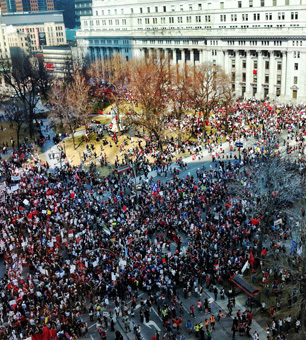 Student Protest in Quebec. (Photo: Pedro fait de la Photo / Flickr)Electoralism and radicalism don’t have to be mutually exclusive, but attendees discovered finding common ground is still a challenge.
Student Protest in Quebec. (Photo: Pedro fait de la Photo / Flickr)Electoralism and radicalism don’t have to be mutually exclusive, but attendees discovered finding common ground is still a challenge.
With student movements erupting around the world, America’s relative calm is conspicuous. On August 10-14, 200 students from around the United States, with representatives from student movements in Puerto Rico, Mexico, and Quebec, met in Columbus, Ohio to start building an American student movement at the (first annual) National Student Power Convergence – causing some to ask, “Will Columbus be the next Port Huron?”
With the tagline “Here. Us. Now.” the students were cognizant of the historical nature of the moment, as were the opening lecturers who addressed the conflicts that have splintered the student left in the past. Joshua Kahn Russell of the Ruckus Society explained that chasing after the “perfect politics” and acting as the “righteous few” was ultimately divisive and ineffective in his activism career. Longtime labor organizer Stephen Lerner argued for “alignment” in a movement around certain issues, rather than trying to get all parties to be ideologically harmonious.
Electoralism quickly became an ideological tension point when some students berated, and walked out on, Keron Blair from the Midwest Academy organizing school for including “electing good people” in his direct action workshop. Political tensions flared again when a group of students organized a “press conference” at President Obama’s campaign headquarters in Columbus. Most students participated in the demonstration, which advocated for bypassing false political representatives but claimed that it wasn’t a “Fuck you, Obama” protest.
Students recognized the strategic role of elections in movements abroad, such as in Quebec, where a rare September election divided Quebec’s longest-running student strike. Émilie Joly from CLASSE, Quebec’s largest student union, received snaps for declaring, “Whether or not you vote, keep mobilizing,” explaining that elections are one of many ways to build student power.
Over the five days, students built community by unraveling the paper-thin stereotypes of radical ideologue and reformist Democrat, allowing students to arrive at useful compromises, such as recognizing that elections are not of ultimate importance but can play a role in broader campaigns.
This mini-documentary attempts to depict the range of perspectives on voting at the National Student Power Convergence and features interviews with Will Klatt, an organizer of the Convergence, Tiffany Dena Loftin, the president of the United States Student Association, and many others.
Join us in defending the truth before it’s too late
The future of independent journalism is uncertain, and the consequences of losing it are too grave to ignore. To ensure Truthout remains safe, strong, and free, we need to raise $29,000 in the next 36 hours. Every dollar raised goes directly toward the costs of producing news you can trust.
Please give what you can — because by supporting us with a tax-deductible donation, you’re not just preserving a source of news, you’re helping to safeguard what’s left of our democracy.